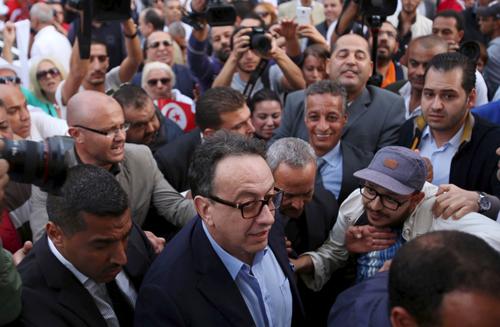You are here
Islamists stand to gain as ruling party split looms in Tunisia
By Reuters - Nov 03,2015 - Last updated at Nov 03,2015

Hafhed Essebsi (centre), son of Tunisian President Beji Caid Essebsi, arrives for a meeting with leaders of the Nidaa Tounes Party in Tunis, Tunisia, Tuesday (Reuters photo)
TUNIS — After weeks of sharp disputes between its leaders, Tunisia's ruling party is on the verge of breaking up, which could allow Islamist rivals to usurp it as the biggest bloc in parliament.
Tensions between two wings of Nidaa Tounes, whose name means Call of Tunis, spilled over into violence last week when a party meeting descended into open fighting with fists and sticks at a luxury hotel at the beach resort of Hammamet.
A split within Nidaa Tounes could trigger political instability in the country that launched the first of the Arab Spring revolutions in 2011.
Unlike peers such as Libya and Syria, Tunisia has made a successful transition to democracy — an achievement recognised last month by the Nobel Peace Prize committee. But key economic reforms have yet to be launched, and two deadly attacks this year have highlighted the threat posed by Islamist militants.
Thirty-two of Nidaa Tounes' 86 lawmakers have already threatened to break away in protest at what they see as attempts by President Beji Caid Essebsi, who founded the secular party in 2012, to impose his son Hafhed as its leader. The president's office rejects those accusations.
Losing those seats would leave the Islamist movement Ennahda, with 67 seats in the 217-member parliament, as the biggest faction in the governing coalition.
"Division means Nidaa Tounes will not be the majority party in parliament and Ennahda will be the first power," said Abada Keffi, a senior figure in Nidaa Tounes.
Another top party official, Bochra Ben Hmida, told Reuters: "We may have to resort to establishing a new party... This is very likely now that dialogue has become impossible."
The political disputes have emerged at a sensitive moment for Tunisia as it looks to tackle reforms to cut subsidies and public spending in order to curb its deficit and meet the demands of lenders, including the International Monetary Fund.
Local elections next year are also influencing party agendas.
Rival wings
After the uprising that ousted autocrat Zine Al Abidine Ben Ali, long-suppressed Islamists emerged as a political force and Ennahda won elections held later in 2011.
That galvanised opponents, including leftists, former regime figures and opponents of political Islam, to form a single bloc and try to capture popular discontent with Ennahda's early performance.
Nidaa Tounes emerged as a political force in 2013 to lead popular protests against the Ennahda government, forcing the Islamists to step down and make way for a non-partisan transitional government and new elections.
It beat Ennahda in elections last year and went on to form a coalition with its rival. But cracks began to emerge over the party's structure, direction and appointments after Essebsi senior was elected president and stepped down as its leader.
Insiders say Nidaa Tounes is now split into two wings, one led by Hafhed Caid Essebsi and the other by Mohsen Marzouk, a former leftist activist and the party's secretary general.
"After what happened, continuing with the one party without a split has become very difficult," Marzouk told local media after the violence at the party conference. "It's unfortunate."
The camp led by the president's son is pushing for a larger role through a party restructuring. But Marzouk's wing resists what some see as a hereditary transfer of power and a return of the autocratic style of the Ben Ali era.
Allies of the president, though, dismiss claims they are looking to force his son into a position of influence.
"Marzouk wants to take control of the party with exclusion of his opponents, and now his ambition is to oust Essebsi and be the next leader in Carthage," said Abd El Aziz Kotti, a senior party member, referring to the presidential palace.
Nidaa Tounes still presents itself as a modern movement and the best choice to defend the gains of the revolution and manage the economic problems of one of the Arab world's most secular countries.
Ennahda has refused to comment on the disarray within its coalition partner, but says it hopes the internal disputes will be resolved in the interest of national stability.
"Nidaa Tounes is drowning now," local columnist Neji Zyiri said in a radio debate, "and its rival, Ennahda, escapes."
Related Articles
TUNIS — A senior member of Tunisian President Beji Caid Essebsi's ruling party said on Wednesday he plans to break away and form a new polit
TUNIS — Thirty lawmakers from Tunisia's ruling party suspended their membership on Wednesday and threatened to resign in protest over what t
TUNIS — Tunisian dissident Mohsen Marzouk opened a congress of his new party on Saturday, rejecting religion in politics and vowing to be a











